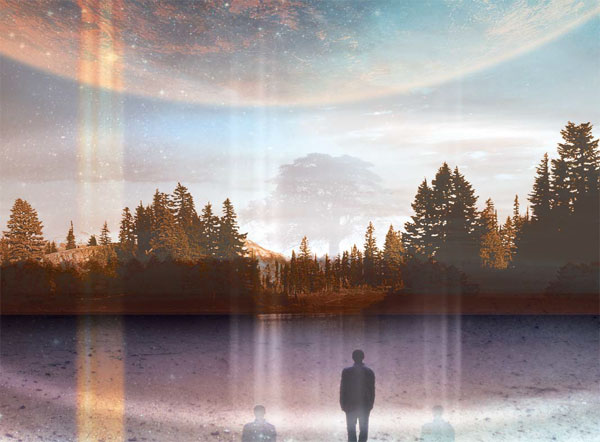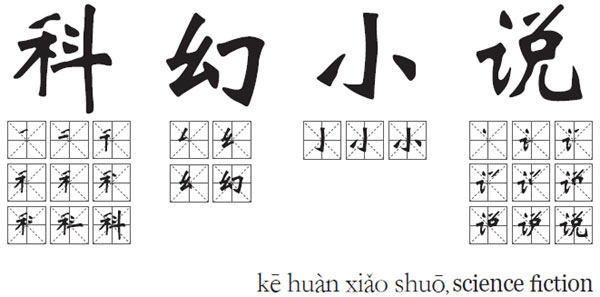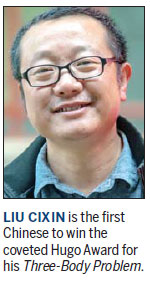'Asian Asimov' sends us to dark forest

Second installment of Three Body trilogy concentrates on a world at war with an unbeatable foe, and what that does to the psyche
Only a few weeks after Dark Forest hit shelves in English, translated by Joel Martinsen, Liu Cixin became the first Chinese person to win the coveted Hugo Award for his Three-Body Problem, the first in the Three Body trilogy.
With this second astounding work of phantasmagorical, space-age fiction, Liu has cemented a name for himself in the world of sci-fi as the Asian Asimov.


Whereas the first in the Three Body trilogy dealt with the politics of the poor wastrel that was humanity in the time of the "cultural revolution" (1966-76) and on to our current cusp of environmental annihilation, Dark Forest is altogether more succinct, more focused. Rather than the politics of a society on the brink (and an alien society constantly on the brink), Dark Forest concentrates on a world at war with an unbeatable foe and what that does to the psyche of society and the individual.
Dark Forest begins where the first left off, leaving many of the characters from the first in the dust (or, in fact, diced into tiny pieces), but fans of the first book will be happy to know that Da Shi makes a roaring comeback.
Besides the coming war, which is centuries away, traveling at a fraction of the speed of light, the true focus of Dark Forest is in the existence of what are termed Wallfacers. The name, perhaps a little difficult to understand in English, is from the Chinese 面壁 (miàn bì), which has a dual meaning of a meditative state and a punishment - like being told to stand in the corner as a child but also to contemplate one's existence.
The Trisolarans, you see, communicate via a strange form of telepathy, having no idea how to translate a difference in the words "think" and "speak". Given the power of the Trisolaran sophons to discover any and all Earth secrets, there is only one place left where planet Earth can hide its plans for war: inside a single human mind.
Each Wallfacer lives a life of perpetual trickery, where they can use the combined resources of planet Earth for the wildest projects imaginable in order to completely dupe the attacking Trisolarans. As Liu states in the book, "The thoughts and behaviors these Wallfacers present to the outside world will be entirely false, a carefully crafted melange of disguise, misdirection and deception. The subject of this misdirection will be the entire world, both enemy and ally."
And, while much of the book is the existential suffering of a life lived outside humanity, fans of hard sci-fi need not worry; the technological advances in this book dwarf the speculative science of the last (though more in scope than in substance). The novel takes us from the comparatively mundane science of carbon fiber to nonmedium fusion engines, space colonies throughout the solar system, and deep space travel.
Indeed, the first in the Three Body trilogy only set up the motive; this is the war. Fans of the first book will remember that the chronology of Earth in Three-Body Problem only reached back to the "cultural revolution" and into the near future (2015, as it happens, though no hyperdimensional protons have yet to threaten me into submission). This novel spans hundreds of years, but thanks to the speculative science of cryogenics, the characters get to sleep and then wake up to a world entirely changed.

Our main character this time is not a low-level physicist in a dead-end research project. It is Luo Ji, who, and I am warning about spoilers, is an unlikely Wallfacer. He has the might of planet Earth behind him and, well, uses it to get drunk and live a life of solitary hedonism. Da Shi, a Chinese foil for a clever film noir detective, is as ever the truly wise one of the pair.
Dark Forest, much like the first novel, hosts a bevy of brilliant military and scientific minds, but the most frightening aspect of Dark Forest is the impending Trisolaran fleet; the most striking aspect of the Trisolarans is that they simply don't give a damn about the might of Earth. Wallfacers come up with plan after brilliant plan using nukes, cruelty, bribery, and even planetary suicide, but the message from the Trisolarans is always the same: go ahead punk, make my day.
This is perhaps the most central question of the novel, namely, how do you deal with a doomed society? The Trisolaran plan to sabotage Earth's scientific advancement was successful in the first novel, so what's left but for humanity to throw up its hands in defeat and wait for Armageddon?
The social concepts of defeatism and escapism, rather than impending alien invasion, are the main foes in this novel for the military elite - the idea that humanity's future lies in annihilation or running away. How do you keep people from buying their way onto a private spaceship bound for the stars? Who gets the tickets to that spaceship? How do you decide? How do you keep military personnel from blowing their brains out at the prospect of facing a race of beings who view humans as insects? Do you bother working? Breeding?
Giving up and running away are not options. The human race is left to stand against an undeniably superior enemy whether they like it or not because escapism ends in social unrest, revolution, or injustice. And defeatism, well, that really only ends one way.
Dark Forest addresses this issue - perhaps in a way that doesn't necessarily translate that well. Ideological purity for victory is essential for the continuation of the war effort, so the subject of defeatism is met with failed attempts at official guidance of thought.
Nations themselves don't fare that well in the novel. The Great Ravine (a social and economic collapse) causes French-speaking Canada to split with Canada (a prospect about as real as the Trisolarans), and nations themselves seem to coalesce into an unimportant mishmash of domestic policy - keeping the lights on until humanity's victory or death. The real war, after all, is heading toward Earth at a fraction of the speed of light. As Luo Ji says: "No need for the long view. Right now the entire universe has been dealt a dead hand."
For readers familiar with Liu's short works - The Wandering Earth, The Longest Fall, Sun of China, and the like - Dark Forest has a greater scope as it pertains to hard science fiction than the first novel, showing progress with both the continuation of what is sure to be remembered as one of the greatest science fiction stories told in recent memory and the progress of Liu as an author. Three-Body Problem may have pointed to the stars, but Dark Forest shoots humanity at them.
Courtesy of The World of Chinese, www.theworldofchinese.com
The World of Chinese
(China Daily European Weekly 01/15/2016 page23)
Today's Top News
- New engine powers cargo drone expansion
- China to boost intl cooperation on green tech
- Factory activity sees marginal improvement in November
- Venezuela slams US' 'colonial threat' on its airspace
- Xi: Strengthen cyberspace governance framework
- Takaichi must stop rubbing salt in wounds, retract Taiwan remarks






























